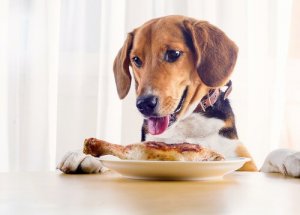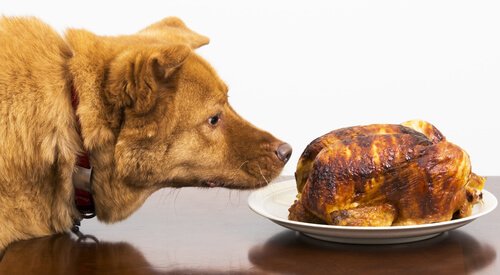Health Alert: 8 Christmas Food Hazards for Dogs

Whether during your holiday dinners, or at any other time of the year, it can be hard not to give your dog food when you see it make those puppy dog eyes. But some foods aren’t good for dogs, and that’s even more true with Christmas dinners. Read this article if you want to know about the 8 main Christmas food hazards for dogs.
Christmas dinner and foods dogs shouldn’t eat

We don’t exactly watch our diets during holidays. But that’s not just a problem for our health, it can also be bad for our pets. Why? Because if you give your pet food that it’s not supposed to eat, or not used to, then it could suffer some health problems.
Don’t let yourself get carried away by that temptation to “just give it a tiny bit” of fudge, grapes, shellfish, or marzipan, as if it were just another guest at your table. Some people make their dogs special “celebratory” meals for these days, but you don’t have to go that far. Your pet probably shouldn’t even change its habits at all, and the fireworks don’t help with that.
8 Christmas food hazards for dogs
Whether it’s for Christmas dinner, or any other celebration (like a birthday), here are the food hazards you should avoiding letting your dogs have.
1. Grapes
Grapes are often popular at Christmas time, and it’s not unusual to have them as a snack before a big meal. Just don’t let your dogs have any, as they’re toxic to a dog’s kidneys.
2. Chocolate
Most people eat it all year-round, but we tend to eat even more for these big dinners, and during the winter. It’s in all kinds of things, too, from fudge, brownies, cake…the list goes on forever.
As delicious as it may be, chocolate contains a substance called theobromine, which is toxic for dogs. Just 4 oz of dark chocolate can be fatal, even for a 30-pound dog.
3. Shellfish
The shells or casings of this kind of seafood contain a substance called chitin, which dogs can’t digest properly. If your dog eats shellfish, it could experience diarrhea, vomiting, or constipation. Be extra careful if you have a Dalmatian, because they have higher levels of uric acid in their stomach and it could give them gout (which is common in this breed).
4. Nuts and seeds
These are another common food to have during Christmas or the New Year. But beware if you’re a dog owner, because dogs also have a lot of trouble digesting these. That’s still true even if you crush them up or mix them with other things, so don’t try it!
5. Lamb
Both the fat and bones from this kind of meat are dangerous for dogs. The fat is dangerous because it can lead to vomiting and diarrhea (among other digestive issues). The bones are dangerous because they’re very small and could get stuck in your dog’s throat, causing it to choke.
6. Turkey

Turkey has similar effects to lamb. Dogs can’t digest the skin or fat very well, and the bones are also very small, and potentially fatal for a dog if it tries to chew them.
7. Sauces
Sauces are a vital part of Christmas dinner, and any meal really. However, there are many sauces that are extremely dangerous for dogs, so you should really avoid giving yours any.
Think about it: sauces often have all kinds of things that are toxic for dogs in them: onion, garlic, pepper, and fried oil. These things can cause problems in both the intestines and heart.
8. Stuffed meat
These are also very common for special meals, and can have anything from condiments, sauces, or sauteed foods that might be bad for your dog. For example, the breadcrumbs in most types of stuffing can cause bloating in a dog.
Some other food hazards for dogs, whether at Christmas or any other time of the year, include: tamales, deli meat, paté, onion, bones, nuts, garlic, and salt.
Whether during your holiday dinners, or at any other time of the year, it can be hard not to give your dog food when you see it make those puppy dog eyes. But some foods aren’t good for dogs, and that’s even more true with Christmas dinners. Read this article if you want to know about the 8 main Christmas food hazards for dogs.
Christmas dinner and foods dogs shouldn’t eat

We don’t exactly watch our diets during holidays. But that’s not just a problem for our health, it can also be bad for our pets. Why? Because if you give your pet food that it’s not supposed to eat, or not used to, then it could suffer some health problems.
Don’t let yourself get carried away by that temptation to “just give it a tiny bit” of fudge, grapes, shellfish, or marzipan, as if it were just another guest at your table. Some people make their dogs special “celebratory” meals for these days, but you don’t have to go that far. Your pet probably shouldn’t even change its habits at all, and the fireworks don’t help with that.
8 Christmas food hazards for dogs
Whether it’s for Christmas dinner, or any other celebration (like a birthday), here are the food hazards you should avoiding letting your dogs have.
1. Grapes
Grapes are often popular at Christmas time, and it’s not unusual to have them as a snack before a big meal. Just don’t let your dogs have any, as they’re toxic to a dog’s kidneys.
2. Chocolate
Most people eat it all year-round, but we tend to eat even more for these big dinners, and during the winter. It’s in all kinds of things, too, from fudge, brownies, cake…the list goes on forever.
As delicious as it may be, chocolate contains a substance called theobromine, which is toxic for dogs. Just 4 oz of dark chocolate can be fatal, even for a 30-pound dog.
3. Shellfish
The shells or casings of this kind of seafood contain a substance called chitin, which dogs can’t digest properly. If your dog eats shellfish, it could experience diarrhea, vomiting, or constipation. Be extra careful if you have a Dalmatian, because they have higher levels of uric acid in their stomach and it could give them gout (which is common in this breed).
4. Nuts and seeds
These are another common food to have during Christmas or the New Year. But beware if you’re a dog owner, because dogs also have a lot of trouble digesting these. That’s still true even if you crush them up or mix them with other things, so don’t try it!
5. Lamb
Both the fat and bones from this kind of meat are dangerous for dogs. The fat is dangerous because it can lead to vomiting and diarrhea (among other digestive issues). The bones are dangerous because they’re very small and could get stuck in your dog’s throat, causing it to choke.
6. Turkey

Turkey has similar effects to lamb. Dogs can’t digest the skin or fat very well, and the bones are also very small, and potentially fatal for a dog if it tries to chew them.
7. Sauces
Sauces are a vital part of Christmas dinner, and any meal really. However, there are many sauces that are extremely dangerous for dogs, so you should really avoid giving yours any.
Think about it: sauces often have all kinds of things that are toxic for dogs in them: onion, garlic, pepper, and fried oil. These things can cause problems in both the intestines and heart.
8. Stuffed meat
These are also very common for special meals, and can have anything from condiments, sauces, or sauteed foods that might be bad for your dog. For example, the breadcrumbs in most types of stuffing can cause bloating in a dog.
Some other food hazards for dogs, whether at Christmas or any other time of the year, include: tamales, deli meat, paté, onion, bones, nuts, garlic, and salt.
This text is provided for informational purposes only and does not replace consultation with a professional. If in doubt, consult your specialist.








